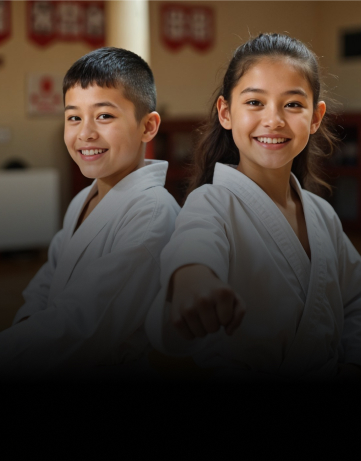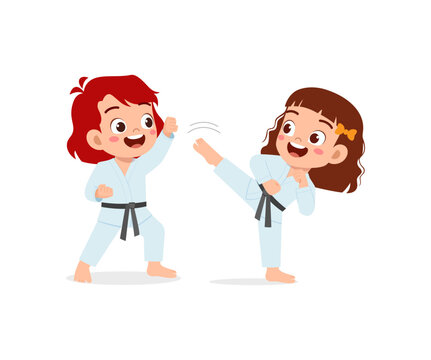Karate for kids – Interactive and Engaging Classes to Build Confidence and Respect
Karate for kids – Interactive and Engaging Classes to Build Confidence and Respect
Blog Article
How Martial Arts for Children Can Increase Confidence and Technique in Youthful Martial Artists
Karate for youngsters offers an one-of-a-kind possibility to build self-confidence and discipline in young martial artists. As they learn brand-new techniques and face difficulties, they not just gain abilities yet likewise create a solid sense of self-respect. This organized atmosphere motivates them to value the trip of improvement. Yet exactly how does this training translate right into their daily lives? Discover the deeper links that make karate greater than just a sporting activity.
The Value of Self-confidence in Childhood Development
Confidence is an essential foundation in youth advancement. When you nurture your youngster's self-worth, you equip them to deal with obstacles, take dangers, and express themselves freely. Youngsters with self-confidence are much more ready to explore brand-new tasks and social circumstances, which can bring about long-term friendships and important experiences.Encouraging your youngster to tip out of their convenience area cultivates strength. They discover that failing isn't the end however rather a tipping rock to success. By commemorating their success, despite just how little, you help them acknowledge their abilities and worth.In this journey, support and favorable reinforcement from you play a crucial duty. Whether it's with appreciation or simply existing, your involvement increases their confidence. As they expand, this self-assurance comes to be a lifelong property, outfitting them to browse both obstacles and chances with a strong sense of self.
How Martial Arts Shows Technique and Focus
Martial arts helps you develop technique and focus through its organized training program. As you practice mindfulness during each session, you'll learn to concentrate much better both on and off the mat. Plus, establishing and achieving goals in martial arts strengthens your ability to stay fully commited and alert.
Structured Training Regimen
While you participate in karate training, you'll promptly find how a structured regimen instills technique and focus in young specialists. Each class follows a specific format, including workouts, method practice, and sparring. This uniformity educates you to devote and appreciate the process to renovation. As you learn types and strategies, you create a feeling of duty for your very own progress.The structured atmosphere urges you to set objectives, whether grasping a brand-new belt or perfecting a kata. You'll find that remaining concentrated during drills and classes develops your focus. The discipline you cultivate in martial arts extends beyond the dojo, favorably impacting your schoolwork and everyday regimens. Each session enhances the significance of dedication, assisting you grow right into a more regimented individual.
Mindfulness in Practice
As you exercise martial arts, you'll locate that mindfulness comes to be a crucial part of your training. Each step requires your full focus, aiding you stay concentrated on the here and now moment. You'll find out to ignore diversions and concentrate on your breathing, motions, and objectives. This heightened understanding hones your reflexes and improves your discipline.During sparring or types, you'll uncover the value of being psychologically existing - Karate Salisbury MD. You'll observe exactly how this focus not only improves your technique yet likewise constructs your confidence. By practicing mindfulness in martial arts, you grow perseverance and strength, necessary qualities that expand beyond the dojo. This way, karate shows you to harness your mind, aiding you establish a self-displined method to obstacles both on and off the floor covering

Objective Setting Techniques
Establishing objectives in martial arts isn't nearly making belts; it's a powerful means to cultivate technique and emphasis. When you set specific, possible targets, you produce a roadmap for your progression. Instead of just aiming to improve your kicks, attempt focusing on mastering a particular strategy each month. This method keeps you motivated and engaged.Breaking down bigger objectives right into smaller, workable steps aids you track your progress and commemorate little victories along the way. Whether it's improving your stance or increasing your sparring endurance, every objective strengthens your dedication. As you achieve these goals, you'll build confidence in your skills and develop a strong sense of discipline that extends beyond the dojo into daily life.
Structure Durability Via Martial Arts
Martial arts, particularly karate, offers children an unique possibility to construct resilience in a helpful atmosphere. In courses, they encounter obstacles that press their limitations, whether it's competing or grasping a new strategy with a companion. Each problem, like a missed out on kick or a lost match, comes to be a chance to learn and grow.As they practice, youngsters discover to embrace pain and keep attempting, also when things obtain difficult. They uncover that failure isn't completion; it belongs to the trip. This mindset assists them jump back more powerful, not simply in the dojo, however in daily life.With each obstacle they conquer, your child builds self-confidence in their capacity to deal with barriers, sustaining their determination. Through karate, they'll comprehend that strength isn't simply about physical stamina; it's concerning mental grit and willpower, empowering them to deal with whatever life throws their means.
The Function of Respect in Karate Training
Respect is a fundamental concept in karate training, fostering a culture of technique and sociability amongst trainees. When you tip onto the dojo floor, you're not just finding out strategies; you're additionally discovering to respect your trainers, peers, and the art itself (Karate Salisbury MD). Bowing at the beginning and end of course isn't just a formality; it signifies your recommendation of others' efforts and dedication.As you establish mutual regard, you'll find it improves your learning experience. You'll listen more attentively to your trainer and gain understandings from fellow students. This atmosphere motivates useful objection and assistance, enabling everybody to expand together.Moreover, respect grows self-discipline. Acknowledging the value of effort and humbleness aids you remain concentrated on your training. In turn, this regard equates right into your day-to-day life, boosting your communications and connections outside the dojo. Via karate, you discover that respect is necessary for individual growth and area building
Attaining and setting goals Success in Martial arts

Social Skills and Team Effort in the Dojo
While training in the dojo, kids normally develop essential social skills and team effort abilities. As they exercise along with peers, they discover to interact properly, share space, and support each other. Each class presents opportunities for cooperation, whether it's during companion drills or team exercises. This synergy promotes relationships and develops a sense of belonging, making the dojo a nurturing environment.Kids likewise get valuable problem resolution skills. When they experience obstacles, such as disputes during sparring, they discover to navigate these situations constructively. They practice perseverance and compassion, recognizing that every person has various toughness and weaknesses.Moreover, joining group tasks cultivates a sense of liability. You'll see your kid discovering to count on colleagues and take obligation for their duty in a team. These experiences not just boost their fighting styles trip but also equip them with social devices they'll carry right into other areas of life.

The Long-Term Benefits of Karate Beyond Childhood Years
As youngsters mature and move into their adult years, the advantages of karate expand much beyond the dojo. You'll discover that the discipline and focus discovered via karate can convert into your professional and scholastic life. Setting and attaining goals in martial arts cultivates a solid job ethic, which can press you to succeed in any type of endeavor.Moreover, the confidence acquired from grasping methods and sparring can improve your self-esteem, aiding you deal with challenges head-on. This resilience becomes invaluable as you face the uncertainties of adulthood.Additionally, the social skills established with synergy and friendship in the dojo can result in much better partnerships in both individual and expert balls. You'll discover to connect properly, resolve problems, and construct a helpful network.Ultimately, karate shapes not simply competent martial musicians, yet all-round individuals all set to take on the globe.
Regularly Asked Concerns
What Age Is Ideal to Start Karate for Kids?
You can start karate as early as age 4 or 5, yet it typically relies on your child's maturity and interest. Finding a class that matches their age and energy level makes a large difference.
Are There Any Type Of Health And Wellness Benefits From Practicing Karate?
Yes, exercising karate offers various wellness advantages. You'll improve your strength, flexibility, and coordination while improving cardio physical fitness. Plus, it enhances emphasis and psychological health, making it a wonderful selection for general physical and great post to read mental health and wellness.
How Commonly Should Kids Go To Karate Courses?
You need to motivate your youngsters to participate in karate courses a minimum of 2 to 3 times a week. Consistency assists them learn strategies effectively and establish abilities, making their experience extra satisfying and fulfilling in the long run.
Can Karate Aid With Taking Care Of Stress And Anxiety in Children?
Yes, karate can assist take care of anxiousness in youngsters. It teaches emphasis and self-control while providing a safe outlet for energy. You'll see your child growing more positive and tranquil as they exercise consistently.
What Equipment Is Required for Children Beginning Martial Arts?

Report this page